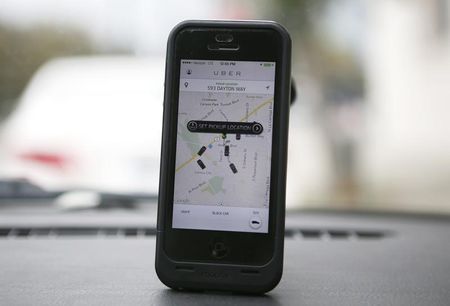By Jan Schwartz and Maria Sheahan
HAMBURG/FRANKFURT (Reuters) - Hamburg has told Uber, a U.S. car service whose smartphone app summons rides at the touch of a button, to stop operating in the German city, adding to resistance the company has faced globally from local regulators and taxi drivers.
San Francisco-based Uber Technologies Inc, valued at $18.2 billion (10.6 billion pounds) in a fundraising last month just four years since its 2010 launch, has touched a raw nerve by threatening to open up a traditionally tightly controlled and licensed market.
Uber customers order and pay for a taxi with its application on their smartphones. Instead of having taxis prowl city streets looking for customers, Uber allows smartphone users to summon a nearby car to pick them up.
Hamburg's transport office sent Uber an injunction on July 21 saying its drivers needed special licenses to transport passengers, a spokeswoman for the office told Reuters on Wednesday, confirming a report published by German monthly Manager Magazin.
The magazine had said drivers who continued to offer their services via the platform could face fines of 1,000 euros (790 pounds).
Uber said its Uber Pop service was not a commercial ride service, rather a platform connecting private car owners with people seeking a ride.
"Drivers riding on Uber Pop are driving their own car," Regional General Manager Pierre-Dimitri Gore-Coty told Reuters. "The whole platform is about allowing those people to drive around a few hours a week to share the cost of owning a car."
Uber said the Hamburg authorities' decision was not final, definitive or binding and it would continue to offer its services in Germany's second-biggest city while appealing.
Uber has faced resistance in cities around the world. In Chicago, San Francisco and Washington, D.C., Uber and similar companies have faced lawsuits from taxi companies hoping to keep out the competition.
In Europe, taxi drivers protesting against Uber last month created traffic chaos in cities including London and Paris, while South Korea's capital Seoul came out this week saying it wanted to ban the app.

Uber, backed by investors including Goldman Sachs and Google, rebuts the criticism and argues it complies with local regulations.
(Additional reporting by Sarah McBride in San Francisco; Editing by David Holmes)
_800x533_L_1412662134.jpg)